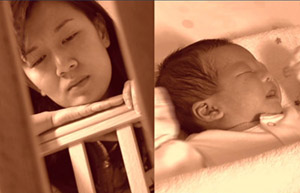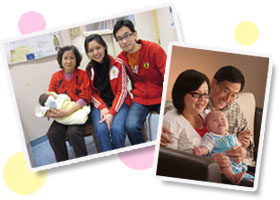Video
As new parents, you and your partner must be excited and overwhelmed by the birth of your baby. While putting all your efforts in taking care of your newborn, don't forget to take care of the needs of yourself and your partner!
Be good to yourself – English
Narrator: The arrival of the baby will bring changes and stresses to the lives of parents. This is especially true to mothers after giving birth as some of them may undergo mood hanges such as emotional instability, loss of appetite, crying spouts, insomnia or irritability. Awareness of these mood changes may help parents control their mood better before their conditions deteriorate and get out of control. If you get irritable and moody while caring for your baby, you should try to relax yourself. For instance, take some deep breaths, remind yourself to stay calm or off to get yourself a glass of water to cool yourself down. If your baby's crying gets intolerable you may put him in a safe place for a while. Then take a rest and listen to some music to unwind the tension.
Scene: Father comes home and calls mother
Father: Honey, honey.
Mother: Our little one's been crying all day, I'm so tired and just want to take a rest.
Father: It must be tiring caring for him. Just leave it to me and take a rest.
Narrator: When you experience stresses in child care, your partner and family members are important sources of support. Besides, try other positive solutions to cope with stresses. For example, you can talk to experienced parents or call hotline centres for advice. You can also seek assistance from medical professionals or social workers if necessary.
Sub-heading: Department of Health, Family Health Service 24-hour Information Hotline 21129900. Social Welfare Department Hotline 23432255. Hospital Authority Mental Health 24-hour Hotline 24667350. The Samaritan Befrienders Hong Kong 23892222.
Postpartum mood changes
With the arrival of the new baby, changes in your daily life will create stress to you and your partner. This is particularly true to women, as many may experience mood changes after giving birth, e.g. fluctuating emotions, crying spouts, insomnia, irritability and loss of appetite etc. If you or your partner fail to detect mood changes and deal with them in time, the stress may increase to the extent of losing emotional control.
Therefore, always pay attention to the conditions of your partner and yourself while trying to give good care of your newborn. If you find that you or your partner's mood is getting bad, you have to remind yourself or your partner to calm down. Walking away to get a glass of water or taking some deep breaths may help to relieve tension and calm down. Remember, both you and your baby's health – physical as well as psychological – are of utmost importance.

Coping with stress
When you are experiencing high tension and in a bad mood, e.g. you get agitated when your baby keeps on crying, you should hand your baby to the care of someone else so that you can take a break. If you cannot find others to help caring for your baby, you can leave your baby in a safe place (e.g. in the crib with secured rails) and unwind your tension. Ignore your baby's crying for the time being. You may check her safety after a while. Your baby will usually fall asleep when she gets tired after crying.
Be positive and try to unload your worries. Things may not turn out as bad as you imagine. The facts are: you will be busy with your new baby; there will be changes in your everyday routines; things you used to manage well may not be so now. They are no big deals. Just accept and re-adjust your expectation. Cut down the house chores or make a simple dinner for your family. You, your partner and other family members will learn to understand and accept all these changes.

Reaching out for support
Your mental health builds on support from your family and friends. Talking to them can help alleviating your stress. Attending talks in the community or calling hotline centres are also useful resources for answers to your queries in childcare. You should seek assistance from the medical and health care professionals or social workers if necessary. The following hotlines will be helpful when you need more support:

